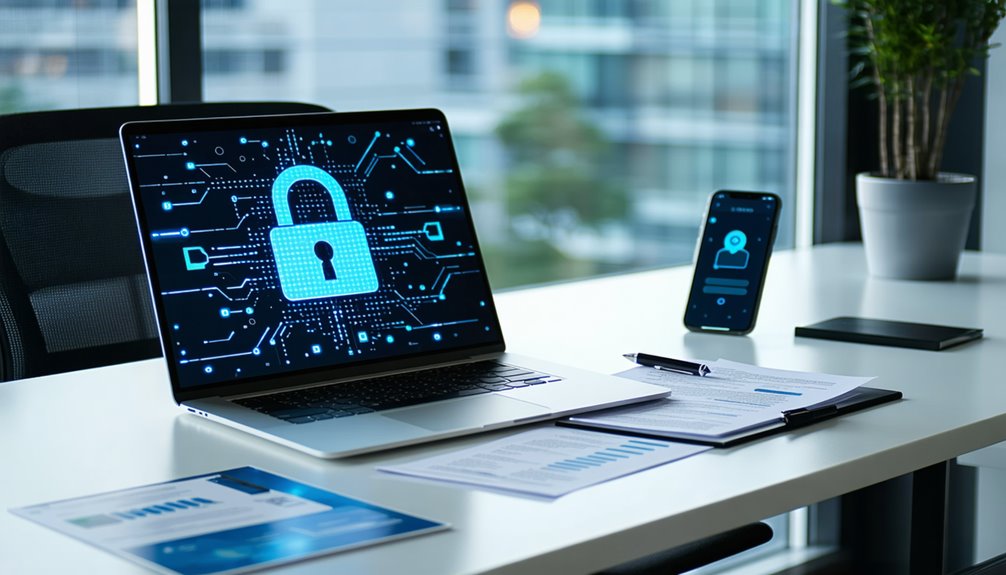In today's digital environment, cybersecurity isn't just an IT issue; it's a key component of your real estate practice. You must understand the unique risks your clients face, especially during transactions. By implementing strong security measures, you can greatly reduce vulnerabilities. However, it doesn't stop there. Cultivating a culture of cyber awareness within your team is equally vital. What steps can you take to enhance your clients' trust and safeguard their information effectively?
Understanding Cybersecurity Risks in Real Estate
As the real estate sector becomes increasingly digitized, it's significant for you to understand the cybersecurity risks that accompany this change.
Cybercriminals are drawn to real estate due to the large sums of money and sensitive personal data involved. Phishing scams, specifically targeting wire transfers and confidential information, pose a major threat. Additionally, the shift from urban to suburban areas has led to more transactions and increased opportunities for cyberattacks.
Data breaches have surged by 65%, exposing critical client details like Social Security numbers and bank accounts. The urgency of transactions often leads to hasty decisions, leaving you vulnerable to social engineering tactics and email compromises. Understanding these risks allows you to recognize potential entry points for attacks, enabling you to safeguard your clients' information effectively. Strong cybersecurity measures are essential to prevent breaches from weak passwords or malicious employees. Awareness is your first line of defense in this evolving environment.
Implementing Effective Security Measures
Implementing effective security measures is key for protecting your real estate business from cyber threats. Start with thorough employee training programs that help your team recognize cyber threats like phishing. Emphasize strong password policies—encourage the use of complex, unique passwords and multi-factor authentication to bolster security. Data encryption is important; confirm sensitive client information is protected during communication and storage. Focus on network security by utilizing firewalls and monitoring systems to prevent unauthorized access. Additionally, be aware that the real estate industry faced $396M+ in losses due to cybercrime in 2022, underscoring the importance of these measures. To reinforce this commitment, regularly seek client feedback to ensure that security practices meet their expectations and concerns. Finally, develop an incident response plan to prepare your team for potential breaches. Conduct regular drills to guarantee everyone knows their role in the event of an incident, allowing for swift action to mitigate damages.
Fostering a Culture of Cyber Awareness
Creating a culture of cyber awareness within your real estate business is key for safeguarding sensitive information and maintaining client trust.
Start by implementing extensive employee training that educates your team on common cyber threats, such as phishing and ransomware. This training should cover best practices for secure communication and data protection, ensuring everyone knows how to identify potential risks. Additionally, emphasize the importance of cybersecurity regulations to help your team understand the legal frameworks that impact data protection. Regular updates on evolving threats will keep your staff alert and prepared. Encourage a proactive approach to threat detection, helping employees understand the importance of secure passwords and multi-factor authentication.
Frequently Asked Questions
How Can I Identify a Phishing Email?
To identify a phishing email, look for email red flags like urgency, poor grammar, and unusual sender addresses. Recognize common phishing tactics such as unrealistic offers and suspicious requests for sensitive information to protect yourself.
What Are Common Signs of Wire Fraud in Real Estate?
To spot wire transfer scams, watch for unexpected payment changes, urgent requests, and fraudulent emails with altered addresses or poor grammar. Always verify instructions independently and educate clients about these warning signs to prevent losses.
How Often Should I Update My Passwords?
You should update your passwords regularly, ideally every 90 days. Focus on password management and complexity; strong, unique passwords enhance security. Adjust this frequency based on any security incidents or potential vulnerabilities you encounter.
What Is the Importance of Multi-Factor Authentication?
Multi-factor authentication significantly boosts security by leveraging various authentication methods. It protects against unauthorized access, reducing risks associated with password breaches. Embracing multi-factor benefits enhances your overall cybersecurity posture and builds trust in your systems and services.
How Can I Securely Share Sensitive Documents?
To securely share sensitive documents, use encrypted file sharing platforms and guarantee secure document storage. Implement strong access controls, utilize multifactor authentication, and educate yourself on best practices to safeguard your information effectively.
References
- https://www.certifid.com/article/navigating-the-future-cybersecurity-and-real-estate-wire-fraud-in-2024
- https://rexera.com/blog/cybersecurity-in-real-estate/
- https://www.certifiedtitlecorp.com/top-6-cybersecurity-measures-for-real-estate-transactions/
- https://www.nar.realtor/law-and-ethics/cybersecurity-checklist-best-practices-for-real-estate-professionals
- https://www.consolidated.com/Blog/ArtMID/3914/ArticleID/240/Prioritizing-Cybersecurity-in-Real-Estate-Transactions
- https://www.hometitlelock.com/articles/understanding-cybersecurity-risks-in-real-estate-what-homeowners-need-to-know
- https://www.fciq.ca/save-and-invest/7-critical-cybersecurity-threats-that-could-devastate-your-real-estate-business-today/
- https://www.securitymagazine.com/articles/99023-understanding-cyber-risks-in-the-real-estate-industry
- https://www.ligris.com/2025/03/cybersecurity-and-real-estate-transactions-protecting-your-investment/
- https://www.formsimplicity.com/blog/best-practices-for-data-security-in-real-estate/

